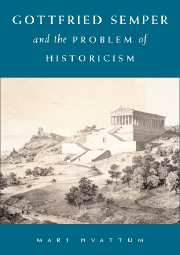Book contents
- Frontmatter
- Contents
- List of Figures
- Prolegomenon
- Introduction – Gottfried Semper: Texts and Interpretations
- PART I TOWARDS A POETICS OF ARCHITECTURE
- 1 The Cult of Origins
- 2 The Doctrine of Imitation
- 3 Semper and the Poetics of Architecture
- PART II PRACTICAL AESTHETICS
- PART III THE APORIAS OF HISTORICISM
- Epilogue
- Notes
- Selected Semper Bibliography
- Bibliography
- Index
1 - The Cult of Origins
from PART I - TOWARDS A POETICS OF ARCHITECTURE
Published online by Cambridge University Press: 06 August 2009
- Frontmatter
- Contents
- List of Figures
- Prolegomenon
- Introduction – Gottfried Semper: Texts and Interpretations
- PART I TOWARDS A POETICS OF ARCHITECTURE
- 1 The Cult of Origins
- 2 The Doctrine of Imitation
- 3 Semper and the Poetics of Architecture
- PART II PRACTICAL AESTHETICS
- PART III THE APORIAS OF HISTORICISM
- Epilogue
- Notes
- Selected Semper Bibliography
- Bibliography
- Index
Summary
“Any discourse should first go back to the simple origin of the subject under review, trace its gradual development, and explain exceptions and variations by comparing them with the original state.”
Gottfried SemperSemper's emphasis on the origins of architecture linked him to a long tradition of architectural thinking. In fact, his origin tale, encountered in the Introduction, bears an unmistakable affinity to Vitruvius's description of the first gathering of men:
The men of old were born like the wild beasts, in woods, caves, and groves, and lived on savage fare. As time went on, the thickly crowded trees in a certain place … caught fire … and the inhabitants of the place were put to flight … After it subsided, they drew near and … brought up other people to it, showing them by signs how much comfort they got from it. In that gathering of men, at a time when utterance of sound was purely individual, from daily habits they fixed upon articulate words just as these had happen to come; then, from indicating by name things in common use, the result was that … they began to talk, and thus originate conversation with one another.
It is suggested here that the origin of architecture is part and parcel of the origin of society. For Vitruvius, as for Semper, language and architecture were two primordially civilising institutions, preconditions for as well as expressions of human culture.
- Type
- Chapter
- Information
- Gottfried Semper and the Problem of Historicism , pp. 29 - 46Publisher: Cambridge University PressPrint publication year: 2004



